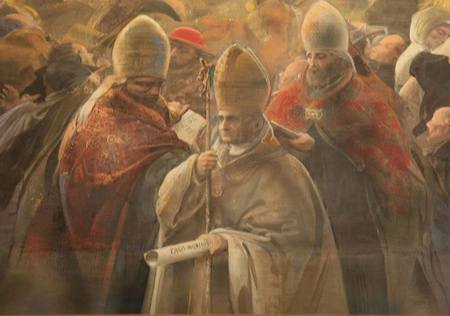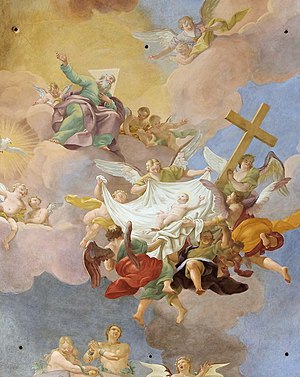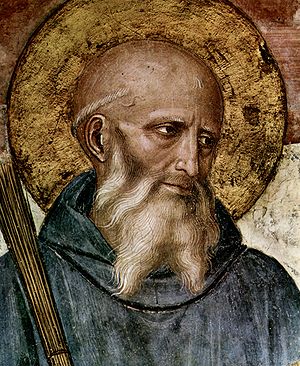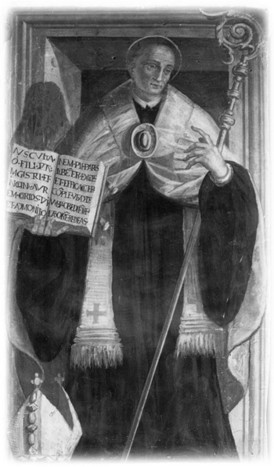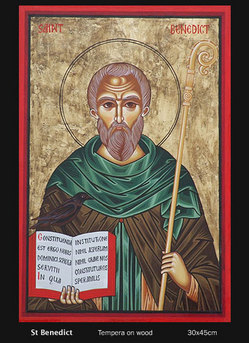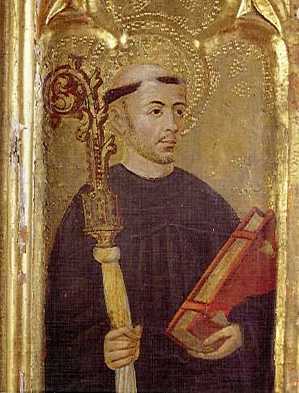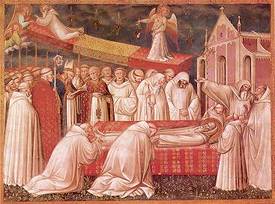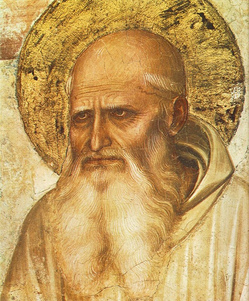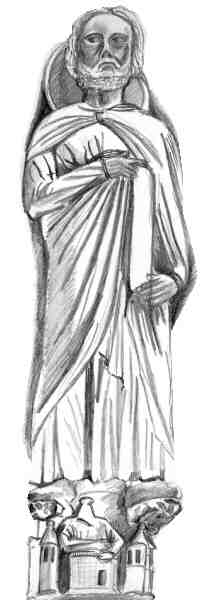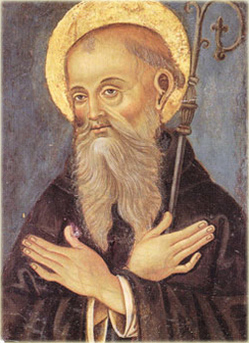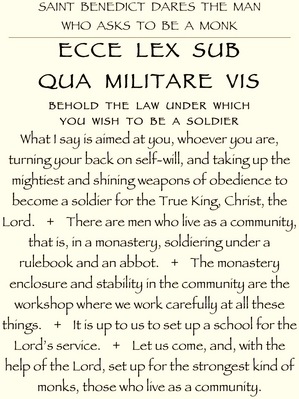God our Father, You made Saint Benedict an outstanding guide
to teach men how to live in your service. Grant that be preferring your love to
everything else we may walk in the way of your commandments.
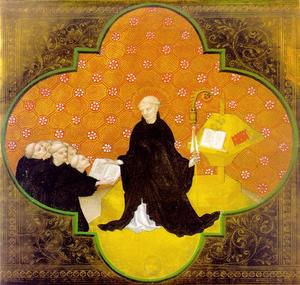
Famous for his work on the 12 degrees of humility, Saint Benedict proposes the following for those who want to advance in the spiritual life. The degrees of humility are given below.
The first degree of humility, then, is that a man always
have the fear of God before his eyes (cf Ps 35[36]:2), shunning all
forgetfulness and that he be ever mindful of all that God hath commanded, that
he always consider in his mind how those who despise God will burn in hell for
their sins, and that life everlasting is prepared for those who fear God. And
whilst he guard himself evermore against sin and vices of thought, word, deed,
and self-will, let him also hasten to cut off the desires of the flesh.
The second degree of humility is, when a man love not his
own will, nor is pleased to fulfill his own desires but by his deeds carried
out that word of the Lord which said: "I came not to do My own will but
the will of Him that sent Me" (Jn 6:38). It is likewise said:
"Self-will hath its punishment, but necessity win the crown."
The third degree of humility is, that for the love of God a
man subject himself to a Superior in all obedience, imitating the Lord, of whom
the Apostle said: "He became obedient unto death" (Phil 2:8).
The fourth degree of humility is, that, if hard and
distasteful things are commanded, nay, even though injuries are inflicted, he
accept them with patience and even temper, and not grow weary or give up, but
hold out, as the Scripture said: "He that shall persevere unto the end
shall be saved" (Mt 10:22). And again: "Let thy heart take courage,
and wait thou for the Lord" (Ps 26[27]:14).
The fifth degree of humility is, when one hides from his
Abbot none of the evil thoughts which rise in his heart or the evils committed
by him in secret, but humbly confesses them. Concerning this the Scripture
exhorts us, saying: "Reveal thy way to the Lord and trust in Him" (Ps
36[37]:5). And it said further: "Confess to the Lord, for He is good, for
His mercy endures forever" (Ps 105[106]:1; Ps 117[118]:1). And the Prophet
likewise said: "I have acknowledged my sin to Thee and my injustice I have
not concealed. I said I will confess against myself my injustice to the Lord;
and Thou hast forgiven the wickedness of my sins" (Ps 31[32]:5).
The sixth degree of humility is, when a monk is content with
the meanest and worst of everything, and in all that is enjoined him holds
himself as a bad and worthless workman, saying with the Prophet: "I am
brought to nothing and I knew it not; I am become as a beast before Thee, and I
am always with Thee" (Ps 72[73]:22-23).
The seventh degree of humility is, when, not only with his
tongue he declares, but also in his inmost soul believeth, that he is the
lowest and vilest of men, humbling himself and saying with the Prophet:
"But I am a worm and no man, the reproach of men and the outcast of the
people" (Ps 21[22]:7).
The eighth degree of humility is, when a monk doeth nothing
but what is sanctioned by the common rule of the monastery and the example of
his elders.
The ninth degree of humility is, when a monk withholds his
tongue from speaking, and keeping silence doth not speak until he is asked; for
the Scripture shows that "in a multitude of words there shall not want
sin" (Prov 10:19); and that "a man full of tongue is not established
in the earth" (Ps 139[140]:12).
The tenth degree of humility is, when a monk is not easily
moved and quick for laughter, for it is written: "The fool exalts his
voice in laughter" (Sir 21:23).
The eleventh degree of humility is, that, when a monk speaks,
he speak gently and without laughter, humbly and with gravity, with few and
sensible words, and that he be not loud of voice, as it is written: "The
wise man is known by the fewness of his words."
The twelfth degree of humility is, when a monk is not only
humble of heart, but always lets it appear also in his whole exterior to all
that see him; namely, at the Work of God, in the garden, on a journey, in the
field, or wherever he may be, sitting, walking, or standing, let him always have
his head bowed down, his eyes fixed on the ground, ever holding himself guilty
of his sins, thinking that he is already standing before the dread judgment
seat of God, and always saying to himself in his heart what the publican in the
Gospel said, with his eyes fixed on the ground: "Lord, I am a sinner and
not worthy to lift up mine eyes to heaven" (Lk 18:13); and again with the
Prophet: "I am bowed down and humbled exceedingly" (Ps 37[38]:7-9; Ps
118[119]:107)
